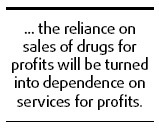Opinion/Analysis
Medical service prices
(China Daily)
Updated: 2009-11-26 07:50
Cutting medical bills to make healthcare affordable for ordinary people is the aim of the current reform of healthcare system; as is the expectation of most people, especially low-income earners.

The national basic medicine system that was initiated in August this year was welcomed as a big step forward in cutting rising healthcare costs. Yet, the announcement by several central government departments on Monday that prices for services such as medical examinations or surgery will be raised has sent cold shivers down the spines of many people.
The thrust of the message of the document, jointly released by the National Development and Reform Commission, the Ministry of Health and the Ministry of Human Resources and Social Security, has been generally interpreted as "cutting the prices of drugs and raising those of medical service".
It is definitely unfair to cut the income of doctors by reducing hospitals' income from medicine sales. In other words, making medical bills affordable to patients should not mean the reduction of doctors' income. Then where does the money come from to make up the deficit? Some have previously suggested that government funding should fill the gap. Now it has become crystal clear that higher charges for services will make up at least part of the losses from the sale of drugs.
| ||||
If that is the case, the reliance on sales of drugs for profits will be turned into dependence on services for profits. High medical bills, the major target of public complaints, will hardly be cut to a level affordable to most. Then, healthcare reform will be meaningless.
There is an even worse scenario: The basic medicine system fails to lower drug prices as doctors over-medicate while the prices for medical services soar. In that case, doctors will become the ultimate winners by earning even more money from both the sales of drugs and providing medical services. As a result, healthcare will become even more unaffordable to ordinary wage earners.
It is understandable that policy-makers hope to enthuse doctors by raising the prices for service they provide. If implemented in a reasonable manner, such a policy will encourage doctors to improve their services and upgrade their technological skills, which will ultimately benefit patients.
Yet, there have been instances of well-intentioned policies making things even worse. So a lot needs to be done before the prices for medical services are increased.
There should be at least a mechanism to effectively supervise the prices of medical services and make sure they are not raised to the level beyond the means of patients. And, off course, they should not add to already high medical bills.













